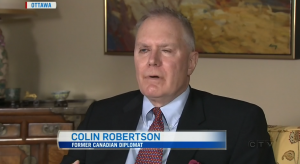CTV News exclusive: 2 in 3 Canadians back Trump on Keystone, NATO

A new poll conducted for CTV News suggests about two in three Canadians are on board with Donald Trump’s proposal to approve the Keystone XL pipeline and the same proportion agree with the president-elect that Canada should contribute its “fair share” to the North Atlantic Treaty Organization (NATO).
At the same time, the Nanos Research poll found strong support for the North America Free Trade Agreement (NAFTA) that Trump has vowed to scrap or re-negotiate, and little appetite for the idea of Canada making special provisions for illegal immigrants he deports.
Here are the highlights from the survey of 1,000 adult Canadians that was conducted in late November.
Keystone XL
Nearly two in three (63 per cent) survey respondents either agreed or somewhat agreed that approval “of the Keystone XL pipeline which connects the oil sands to the U.S. market would be good news for Canada.” About one in three (32 per cent) either disagreed or somewhat disagreed, according to the pollster.
The plan for the 1,900-km pipeline from Alberta to refineries in the southern U.S. was quashed by U.S. President Barack Obama just over one year ago, despite support from a politically-diverse group of Canadian leaders including Liberal Prime Minister Justin Trudeau, interim Conservative leader Rona Ambrose and NDP Alberta Premier Rachel Notley.
In May, Trump told reporters he would “absolutely approve” the pipeline, but added he would want America to get “a piece of the profits.”
Defence spending
On NATO, Trump has repeatedly said the U.S. is paying more than its fair share for the mutual defence pact put in place to protect North America and Europe, calling it “unfair” and a “rip off.” President Obama has also chided Canada for not contributing its “fair share,” which the 28-nation bloc defines as two per cent of GDP. The U.S. spends far more than that – 3.5 per cent. France and Britain meet the target. Canada spends only one per cent.
The survey found about two in three (63 per cent) agreed or somewhat agreed with the statement “Canada should increase defence spending so that it pays its fair share of military costs as part of NATO.” About one in three (32 per cent) disagreed or somewhat disagreed. Five per cent said they were unsure.
NAFTA’s impact
Nanos also asked: “Do you think the Canadian economy is better off, worse off or there has been no impact because of the North America Free Trade Agreement between Canada, the United States and Mexico?”
Nearly six in 10 (57 per cent) said NAFTA has left Canada better off, while only one in five agreed it left Canada worse off. Meanwhile, 18 per cent said they were unsure and six per cent said it had no impact.
The results suggest growing support for NAFTA since the same question was asked in Sept. 2012. At that time, only 28 per cent said the pact had left Canada better off, compared to 26 per cent who said it left Canada worse off, 16 per cent who said it had no impact and 30 per cent who said they were unsure.
Acceptance of illegal aliens
Donald Trump’s vow to deport 11 million illegal immigrants from the United States could send many knocking on Canada’s door. But, the Nanos poll suggests, most Canadians would not accept “making special provisions to accept illegal aliens who may be deported from the United States.”
Only about one in three (32 per cent) agreed or somewhat agreed with the idea of making special provisions for those deported, while about six in 10 (61 per cent) either disagreed or somewhat disagreed. Seven per cent were unsure.
Methodology
Nanos conducted an RDD dual frame (land- and cell-lines) hybrid telephone and online random survey of 1,000 Canadians, 18 years of age or older, between Nov. 26 and 30 as part of an omnibus survey. Participants were randomly recruited by telephone using live agents and administered a survey online.
The margin of error for a random survey of 1,000 Canadians is ±3.1 percentage points, 19 times out of 20.


